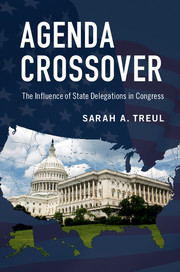Book contents
- Frontmatter
- Dedication
- Contents
- List of Figures
- List of Tables
- Acknowledgments
- 1 State Delegations in Congress
- 2 A History of State Delegations
- 3 State Delegations and Legislative Behavior in the House
- 4 State Delegations and Legislative Behavior in the Senate
- 5 Agenda Crossover in the U.S. Congress
- 6 Rethinking State Delegations in Congress
- Appendix A Interviews
- Appendix B Wisconsin's Unwritten Rule
- Bibliography
- Index
6 - Rethinking State Delegations in Congress
Published online by Cambridge University Press: 13 April 2017
- Frontmatter
- Dedication
- Contents
- List of Figures
- List of Tables
- Acknowledgments
- 1 State Delegations in Congress
- 2 A History of State Delegations
- 3 State Delegations and Legislative Behavior in the House
- 4 State Delegations and Legislative Behavior in the Senate
- 5 Agenda Crossover in the U.S. Congress
- 6 Rethinking State Delegations in Congress
- Appendix A Interviews
- Appendix B Wisconsin's Unwritten Rule
- Bibliography
- Index
Summary
In 2010, 2012, and 2014 Republican Dan Sebring challenged incumbent Gwen Moore (D-WI) to represent the Fourth Congressional District in Wisconsin. As mentioned in Chapter 1, much to Sebring's dismay, he never received an endorsement from a sitting Republican congressman from the state of Wisconsin due to the “Unwritten Rule.”The “Unwritten Rule” states that sitting congressmen should not endorse candidates challenging incumbents in the state, even if the incumbent is a member of a different political party. The “Unwritten Rule” is an explicit protection of the state's incumbents – by the state's incumbents – regardless of party affiliation. This example illustrates that even in today's polarized Congress, members prefer their delegation to have a consistent and experienced membership regardless of its partisan makeup. Additionally, the example suggests that members of states are still interested in protecting incumbents. Members seemingly value experience, seniority, and consistency in the delegation over its partisan makeup. This begs the question: How are members utilizing the delegation today that makes them care about the consistency of membership?
This book sets forth to address this question and also the more general puzzle I encountered when asking members of Congress about influences on their legislative behavior. When asked, members consistently told me their party played an important role in influencing their behavior, but more often than not, members also emphasized the importance of their state delegation. This led me to ask three questions: 1) How often are state delegations voting similarly and sponsoring similar legislation in today's Congress? 2) How can members of a delegation utilize each other's legislative agendas to stay abreast of issues important to the state? 3)How do members utilize their delegation to help ensure their own electoral success? Members clearly value their state, which makes me assume states and their delegations are providing members with important information and assistance. What type of benefits are state delegations providing their members? And how do these benefits enhance representation and responsiveness in Congress?
To demonstrate how state delegations today assist their members to promote successful representation and responsiveness and aid in the members’ electoral success, I put forward the theory of agenda crossover.
- Type
- Chapter
- Information
- Agenda CrossoverThe Influence of State Delegations in Congress, pp. 141 - 152Publisher: Cambridge University PressPrint publication year: 2017



